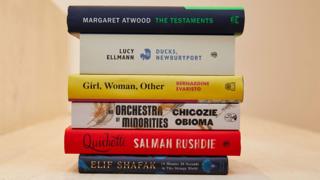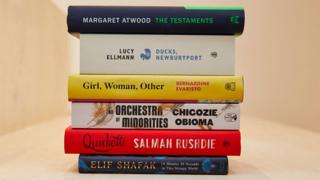Why Booker shortlist is more taxing for some readers
Publishers say VAT charged on e-books and audiobooks unfairly pushes up prices for the partially sighted. …

 Image copyright Booker Prize
Image copyright Booker Prize If you want to plough through the Booker Prize shortlist before the winner is announced on 14 October, the pile of books in hardback will cost you just under £90.
But if you are blind or partially sighted and rely on audiobooks, you will pay around 50% more, in part due to the sales tax levied.
Publishers are calling for VAT on audiobooks and e-books to be axed.
They say it unfairly penalises those who struggle to read traditional books.
“It has been a long-standing principle that governments won’t seek to tax and provide a barrier to books, education and knowledge,” says Stephen Lotinga, chief executive of the Publishers Association.
A consumption tax of 20%, or Value Added Tax, is levied on all goods sold in the UK unless they are exempt, as are children’s clothes, most food, and traditional, printed books.
So while the higher price of audiobooks is partly down to the cost of hiring actors and studios to record them, they could be more affordable if they too were exempt.
Publishers are pushing for audiobooks and e-books to be treated the same way as printed books and hope that Chancellor Sajid Javid will make the change in this autumn’s Budget.
Forty-two senior figures from the UK’s publishing industry have signed a letter urging him to make the change.
In 2018, the UK publishing industry generated £3.6bn in total book sales, £2.9bn of which was from physical book sales and £653m from digital, according to the Publishers Association.
At 88, Mary Bish still enjoys reading but suffers from macular degeneration and struggles to get to a bookshop or library due to mobility issues.
She says being able to get books on her tablet and enlarge the text is “absolutely brilliant”.
But she feels discriminated against when it comes to the price.
“It is unfair we should be taxed while people who read ordinary print books are not taxed,” she says.
“There are about two million people in the UK who are classified as visually impaired,” says Mr Lotinga.
“Obviously being able to listen to books or being able to manipulate the size of the text easily on a screen is hugely important to people who struggle to read.
“We want to make sure they’re not penalised on the basis of their disability.”
It is not only the partially sighted who would benefit, however, he argues.
The National Literacy Trust says one in eight disadvantaged children in the UK do not own any books.
Mr Lotinga says if books are available at low cost in digital formats, low-income families are much more likely to access them via their phones or tablets.
More than 100 MPs and several authors – including Stephen Fry, Helen Fields, Joanne Harris and Paula Hawkins – have expressed support for the campaign.
The Booker Prize Foundation already works with the Royal National Institute for the Blind to fund production of the Booker Prize shortlisted titles in braille, giant print and audio. The formats are ready by the date the winner is announced.
A Booker spokeswoman said: “People with sight loss have a limited choice of books in accessible formats and often have to wait much longer than their sighted peers for titles to be made available to them – and there are many more books that they will never have the chance to read. The Foundation is working with RNIB to change this story.”



